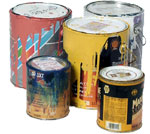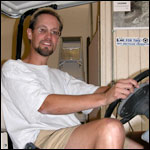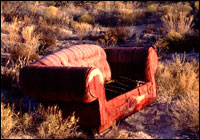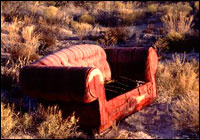
Paint of no return.
Let’s say you’re cleaning out your garage. Maybe you run across some old cans of paint and a couple of rickety chairs you’ve never gotten around to fixing. Would the Salvation Army want them? Not likely. You could throw the stuff out, but there’s that pesky issue of landfill space — and besides, someone might be able to use them. If you’ve got an Internet connection and a few minutes to spare, there’s an elegant solution. It’s called freecycling.
Freecycling is simple. If you live in one of the 499 U.S. cities or 63 foreign ports of call that now have freecycling groups, you just post a short message to your local group’s listserv. “OFFER: Two gallon cans paint, one half used, shocking pink,” you might type into the subject line. And, “OFFER: Two wooden chairs, squeaky but salvageable.” Then, you wait for the email to roll in. With luck, a fellow freecycler will soon claim your stuff, drop by to pick it up, and give you both a nice fuzzy feeling.
“There’s nothing more fulfilling than when someone’s driving away with something they really needed,” says Deron Beal of Tucson, Ariz. “Especially if to you, it was just your spouse’s old clutter in the basement.”

Man with a freecycling plan:
Deron Beal.
Photo: Jimmy Boegle, Tucson Weekly.
Beal, a 36-year-old with an M.B.A., is the force behind freecycling. Last year, the recycling program he works for — a nonprofit called Downtown Don’t Waste It! — was starting to accumulate lots of cast-off office supplies. “I started calling other nonprofits, and I started to learn, ‘Okay, they take computers, they take office materials,'” he remembers. “Then I thought, ‘Why don’t I just make up a listserv?’ Then, I said, ‘Well, hey, if I’m going to do a listserv, why not just open it up to anyone who wants to join?'”
Thus it began. On May 1 of last year, Beal sent out his first official offer: He’d recently gotten married, so he posted his newly combined household’s extra queen-size bed. Soon the bed was off his hands, and freecycling was off and running.
The listserv, which originally included just a few friends and local nonprofits, grew slowly but steadily. The freecyclers not only listed objects they wanted to unload, but requested items they needed. Before long, an article in a Tucson newspaper boosted membership to 100 people. “I thought, ‘Oh my God, this will never work,'” says Beal. “Then, we got up to 500 or 600 people and it was still working, and I thought, ‘Oh my God, think of the potential.'”
It didn’t take long for others to recognize freecycling’s potential. Last September, a mention in Utne inspired environmentalists and cheapskates around the country to start local freecycling groups. “I thought it would be great to have a way to keep things out of landfills,” says Joanna Witting, the founder and moderator of the Chicago freecycle group. The Chicago group got off to a slow start, but it now has more than 2,500 members and heavy email traffic.

By far the largest freecycling group is in Portland, Ore., where more than 5,200 members post dozens of messages each day. The listserv reads like a core sample of a landfill: On one recent day, the offers included wood (“a huge poplar tree, recently felled, approx. 75 ft. tall”), a small yellow bedside table (“cute”), a box of masonite squares (“great for art projects”), a boat (“it doesn’t float but you could make it”), and — last but not least — a head of cabbage (“call to arrange pickup, preferably tonight”). That same day, Portland freecyclers were in search of a booster seat, bamboo plants, a toaster oven, topsoil, two canoe paddles, and a pair of mannequins (“head is not necessary”).
“Giving stuff away is no problem, but getting stuff you might need is a little trickier, because it moves so fast,” says Albert Kaufman, the Portland group’s co-moderator. “But we don’t get that many people who leave [the list], so we must be doing something right.”
Good Things Come to Those Who Weight
In Portland and around the nation, freecyclers have hammered out a few rules. They’ve decided to “keep it free, legal, and appropriate for all ages,” nixing guns and stacks of old girlie magazines. Most groups allow pets to be offered. All discourage trading, politicking, and other off-topic email. Freecycling moderators have their own list, where they ponder sticky issues that emerge in their groups.

Don’t put that old sofa out to pasture.
One of Beal’s early worries was that nonprofit groups — the usual recipients of unwanted but still-useful stuff — would lose out on donations. But nonprofits have continued to join the lists themselves, and often post requests and snap up offers. Beal estimates that 40 to 50 nonprofits are members of the Tucson group. “Now they can ask for what they want,” he says. “They need furniture? In a blink of an eye they can get it. They need a computer? All they have to do is sneeze.” Most groups suggest that members give first dibs to nonprofits. Meanwhile, Beal says, freecycling finds homes for things that charities won’t take: piles of gravel and fill dirt, busted appliances, odd socks, junker cars — in short, the vast and varied universe of stuff that’s not quite garbage.
Freecyclers insist they’re not just moving clutter from one place to another. Some members say they’ve struck up friendships with one another, and some say they’ve given away things they never planned to get rid of. Many messages encourage extra generosity, making requests on behalf of students, ill relatives, or down-and-out friends. “My daughter’s first-grade teacher has asked if anyone has an arched trellis that they no longer want,” a mother recently wrote to the Tucson list. “Thanks to several generous freecyclers, the school garden is really starting to look beautiful.”
Beal himself isn’t often on the receiving end of freecycling, but he’s given away a telescope, a table, and a weight set. “I just got an email from the guy I gave the weight set to, and he told me he’d lost 20 pounds of fat and gained 10 pounds of muscle in the past two months,” he says. “I told him, well, that’s great — I lost 200 pounds of weight when I got rid of the thing.”
Freecycling may sound like a groovy underground phenomenon, but its appeal seems all but universal. Moderators are getting so many press calls that some have asked fellow freecyclers to act as their public-relations agents, and freecycling is already the subject of at least one master’s thesis. Early this month, Beal shared space with the stars in People magazine’s “50 Most Beautiful People” issue. (Well, OK, Beal wasn’t chosen as one of the most beautiful, but he was featured in the same issue.) Recent coverage by The New York Times and The Wall Street Journal has also amped up the attention. Beal estimates that hits to the freecycling website have increased tenfold in recent weeks; freecycling groups have registered about 25,000 new members in the last month, and overall membership has just broken the 100,000 mark.
While Beal says the attention is “99 percent beautiful and wonderful,” he’s a bit overwhelmed. “All I did was set up a listserv, and a year later I’m getting my face powdered for a People magazine photo shoot,” he laughs.


